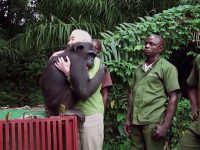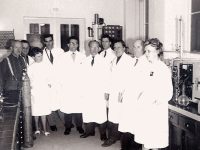Yuval Noah Harari
«Science's agenda is dictated by ideology or religion»
Historian and author of Sapiens: A Brief History of Humankind
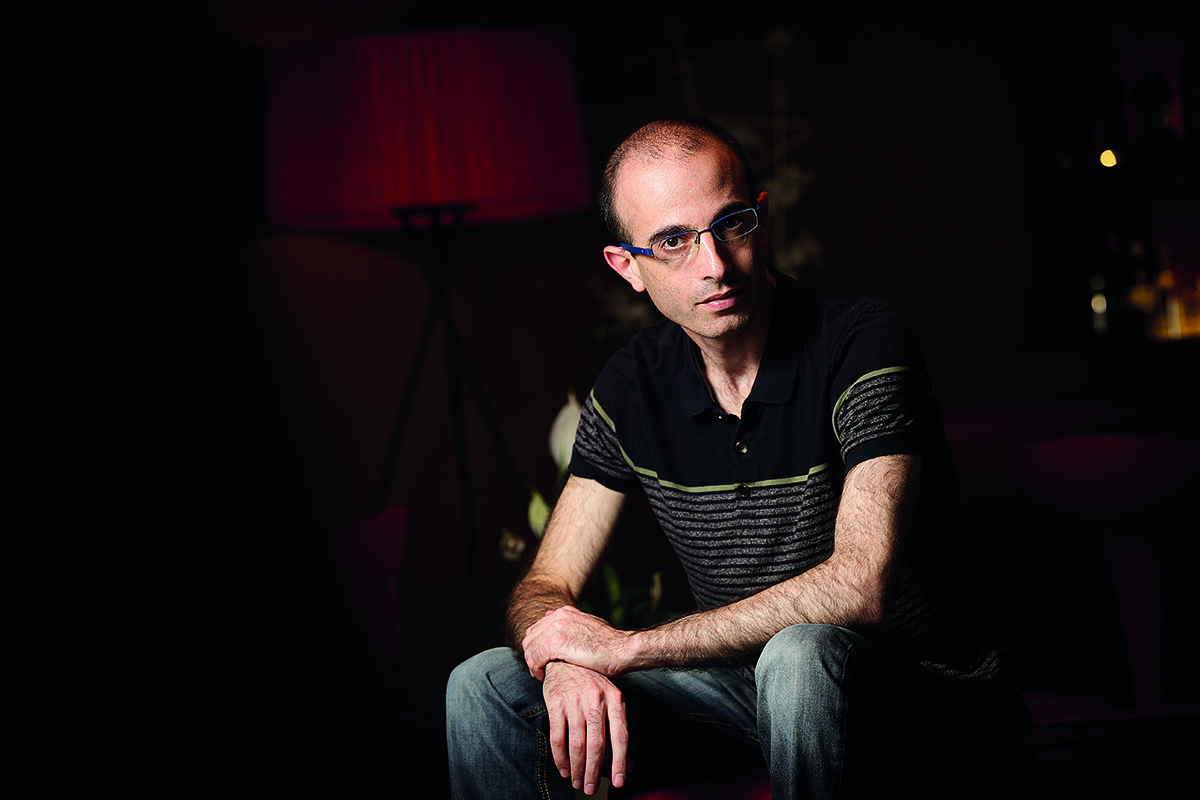
Yuval Noah Harari (1976) is the author of Sapiens: A Brief History of Humankind, a book recently published in Spanish that has been a worldwide success. Educated at Oxford in History, Harari is currently working at the department of humanities at the Hebrew University of Jerusalem. It seems relevant to highlight his humanistic background because of the encyclopaedic knowledge found in numerous pages of the book, but it is especially important because this author claims that history should be studied from a humanist point of view, and not from a materialistic and inspired by natural science standpoint.
In recent decades we had come to deem natural that scientists from disciplines such as biology or physics –the so called natural sciences– venture into traditionally humanistic areas. Platforms like John Brockman’s The Third Culture encouraged biologists to discuss issues such as freedom, and persuaded neurologists to claim to be listened to when law and justice are discussed. Humanism seemed doomed to gradually back down, letting others address the big questions, which had traditionally been addressed by this field of knowledge. Harari, however, vindicates the role of humanities when it comes to studying history, as he believes that this can only be properly understood considering culture and the mind. Both nature and our brain –i.e. the subject of the natural sciences– only provide anecdotal and secondary information. The attempt to bring everything down to genetics, for example, is a mistake that leads to just forgetting about the most important thing: our minds.
Harari has also become a kind of contemporary sophist when he calls fiction everything that is not capable of suffering. Gods, nations and money are constructions created by the human mind and have no root in reality. This ability to control fictional worlds is, according to this author, what makes humans unique. We humans are special beasts because of our mind.
In this book you split human history into three periods and turning from one to another is the product of successive revolutions.
I understand revolution as a basic change in the structure of the world and human society. I split my book into three major revolutions: the cognitive revolution meant the beginning of history. Previously, humans were no different from other animals. The agricultural revolution meant another leap that increased human power. The scientific revolution is the third great revolution. Thanks to science we can become gods and create life. It is not only the greatest revolution in history, it is also a biological revolution, since now we can control our own evolution.
You claim that the cognitive revolution consisted basically on becoming able to imagine things not yet in existence and that this is a very important characteristic of the human species.
For me it is important to differentiate fiction from reality. It is one of the most important issues in history. Are gods just fiction? What about nations? And Human Rights? What is real in the world? To make this distinction I apply the suffering test. For example, when a war is lost, we can even say that a nation suffers, but it is only a manner of speaking. If a bank needs to start arrangements with creditors, we say they are going through difficult moments, but again this is a metaphorical use of language. It is people who suffer when they go to war or lose their savings, not nations or banks. It is not a metaphor, it is a reality. We often deem important matters that are only fictitious. We worry about nations, gods and money, and we forget about the world’s harsh reality: emotions and feelings, but also feeling good about yourself.
«For the human mind success is not enough; after reaching a goal you always want more. We never feel satisfied despite our successes»
And despite their being fictions, you also claim that, along with the gods, they played a major role in economy.
In order to keep an economic exchange confidence is important. If two chimpanzees that had never seen each other before run into each other in the forest, they will not exchange anything. How could they trust each other? Instead, if two strangers run into each other in the forest and belong to different tribes, they can establish a relationship of confidence through religion. If the same spirit watches over their tribes, this faith in the same spirit will be a foundation for trust and they may even regard each other as brothers. This confidence can facilitate agreement; it closes deals and makes exchanges. Today something similar happens with money. Even though they are complete strangers, the fact that two people use bank notes lays a foundation for trust with which to do business transactions.
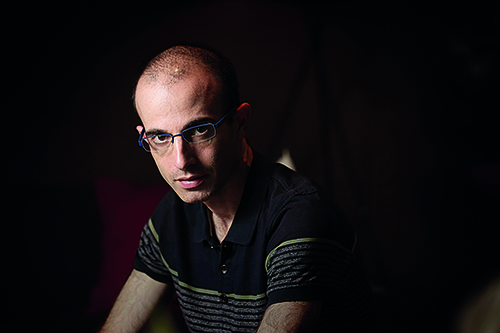
Yuval Noah Harari, historian. / Jordi Play
In your own words, the cognitive revolution had a biological cause, something changed in our brain. But how can we consider this transformation in light of natural selection?
When you do not know something, the best thing you can do in science is to acknowledge your ignorance. Thus you are giving a chance to research. There was a great change in the Homo sapiens cognitive abilities about sixty or eighty thousand years ago, coinciding with its departure from Africa. The first pieces of evidence of art, religion and technology belong to this period. Obviously something had to happen, but skeletal surveys show no difference –they were physically the same as before, and the brain size did not vary either. The best theory we have today is the belief that the internal structure of the brain was altered. Maybe two brain regions that until then were disconnected connected. But we lack evidence, this is only a hypothesis. We do not have an answer to this question.
Do you consider yourself an optimistic when studying the history of humankind?
Human history is a very complex and complicated process. Not everything is black or white. We can find both positive and negative aspects. Violence is decreasing; we live in the most peaceful period of history. There are people starving, but the population in most countries do not die of starvation. On the other hand, we also live in a time when our ecological system is being destroyed, and several animals and plants are becoming extinct. Human power increases exponentially, but our state of wellbeing and happiness does not. Nowadays people are not more satisfied with their lives than in the past. Surely this is a basic reaction of the human mind –success is not enough; after reaching a goal you always want more. We never feel satisfied despite our successes.
«The best theory we have today about the Homo sapiens ‘s brain great change is the belief that its internal structure was altered right after we left Africa»
What is your solution to that?
The solution would be not paying as much attention to trying to change the world around us, and, instead, investigating the way our mind works. Our problem is that we feel no satisfaction, and that happens inside our minds. Nothing that happens out in the world will change this fact.
But this inclination to want more looks related to capitalism.
The power we are gathering is destabilizing the entire ecological system in such a way that threatens the existence of animal species we did not even know existed. Capitalism is built around an idea: economic growth. Only growth is acceptable. Zero or negative growth are understood as a tragedy. There is a growing conflict between capitalism and ecological balance. Capitalism is built on constant growth and avoids balance. Balance means no growth, and that is terrible news for capitalism.
If I understand your reasoning, you are saying that by understanding our brain better we will end up developing an economic system that is more harmonious with nature.
I do not know if it is all about studying the brain. At present there is a strong investment in the brain sciences, and that is very good, but instead we are neglecting the study of the mind. Brain and mind are not exactly the same, even though many people think so. Some claim that the mind is nothing but the process the brain makes, and therefore, if we study the brain properly, we know everything. But I do not think this is an appropriate way of thinking. Perhaps in the future we will know how brain and mind are connected and even if they are really the same thing. But today we are far from reaching this point. It is like making a tunnel that crosses a mountain. If we start drilling two holes simultaneously, one on each end of the tunnel, we can come to believe that sooner or later they will meet. But for now they are two different tunnels. If we focus all our efforts on the one side only, we will forget about important aspects that underlie on the other side.
«Historical facts are cultural processes, many of which are accidental. If the cultural side of history is ignored, we are missing the point»
What do you understand by mind? Which aspects should we study?
The mind is made up of subjective experiences, such as becoming angry or being afraid. We are beginning to understand that when we become angry, some areas of the brain are activated. We already know that, but we are far from knowing how electrochemical impulses create subjective experiences. Ironically, the more we understand how our brain works, the more difficult it is to know how the mind works. Brain studies show that a set of neurons activate other sets of neurons, like dominoes. If so, at what point do we need subjective experiences? What are their function? Why do we need them beyond electrochemical processes? What is the use of having subjective experience of pain, fear or love? I think we are far from reaching a solution. This is the hard problem of consciousness.
In your book, you not only stress the importance of material aspects but you also talk about mental phenomena, such as the aforementioned reference to the imagination.
Definitely. Knowing about material forces is important, but material forces alone cannot explain history. Using materialistic references to climate and geography to explain historical facts is totally inadequate. For example, if I want to know why Christianity spread throughout the world, talking about Mediterranean climate is not very helpful. I think historical facts are cultural processes, many of which are accidental. If the cultural side of history is ignored, we are missing the point.
Ideas have an influence on reality.
Some people think that genetics can explain everything, but with a very simple example we can see it is not so. Take the history of twentieth-century Germany, and imagine a person born in Berlin in 1900 who dies a hundred years later. This person will have the same DNA throughout his or her life and will be affected by the same kind of climate. Despite these constant factors, throughout his/her lifetime he/she will have lived through William II’s empire; the Democratic Republic of Weimar, which meant a big change; afterwards, Nazi Germany; then a communist dictatorship; and finally a democratic and united Germany. We are in front of five very different political-social systems. How does climate or DNA structures help us understand these changes? If we want to understand football, we have to understand what sidelines are, where are the 18 yard boxes or the penalty spot. This information is the foundation, and the same happens with biology. However, if you do not understand more than that, then you do not understand football at all. But this is not it –we should describe what players do.
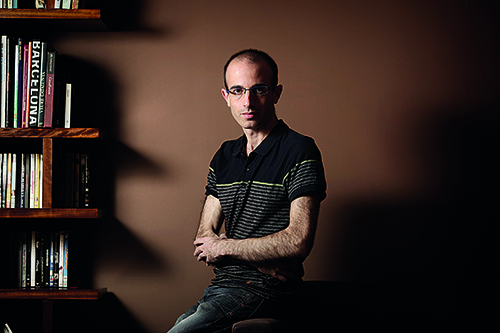
Yuval Noah Harari, in a moment of the interview. / Jordi Play
How could we define Homo sapiens?
It is a living creature who is worth of our attention because it has two closely linked skills. It is able to cooperate forming huge groups. No other animal that is able to create a sophisticated network of cooperation as the Homo sapiens is. This is the source of our power. The power is not within the individual but in the cooperation network that has made this species the ruler of the Earth. Also, its ability to create fictions, as we have mentioned above. No other animal believes in gods, nations or money. Cooperation and fiction are linked, since cooperation networks are based on fiction.
Is fiction then the human being’s main feature?
Sometimes we define human as the animal that makes tools. That is true, but it is even more important to define it as a story-teller.
What about science? It is precisely the opposite of fiction. It is the search for truth.
Science cannot exist by itself. It always needs to be linked to either ideology or religion. Science cannot address questions that involve values: what is good or bad? What is more important? Science can only explain how some aspect of reality work, but there is no scientific way of deciding what is more important when there is conflict between values. We have to make decisions and science needs ideology for that. Let’s imagine we have a limited amount of money for research. This situation requires a decision on how to invest the money –do I want to study cancer, do archaeological research or land in Mars? What is more important? I can invest the money in a study to increase the production of milk using genetic engineering; or in another study that focuses on the suffering of cows when they are separated from their calves, with the aim of reducing their suffering. Science can not choose what is best to study, but ideology can. Capitalism would say that we must increase milk production. Animal rights champions, however, would choose differently. Science’s agenda is dictated by ideology or religion.
«Technology will eventually be able to change the basic laws of the game of life. Anything that is significant for us will cease to be relevant, as we will be able to modify both our body and mind»
That means irrationality will always control reason. It seems contradictory.
Perhaps it is, but this is how it goes. Values control agendas. Large investments in nuclear physics all along the twentieth century can be explained because superpowers wanted nuclear weapons. Instead, a lot less has been invested in archaeology. That does not mean that archaeology is less important –an ideological decision has been made. In any case, I find that the criteria that should guide our decisions would have to be reality, not fiction.
Some scientists, like Nicholas Wade, have given rise to a strong controversy for defending that there are indeed different races within the human species. What is your opinion regarding this topic?
This is shaky ground, but still it is a scientific area that can be examined empirically. Socially there are no cognitive differences between humans. I will give a counterexample from the history of my people, the Jews. Jews have lived a good part of their history without a country, and were forbidden to serve in the army of the country where they lived. Europeans believed that after two thousand years without participating in any battle, they would have lost their ability to fight. But when Israel was founded, they created an army and it happens to be very good. If natural selection acted, skills in the art of war should be an important factor, because if you are not good enough you end up dying. After two thousand years we should have lost all our abilities and fighting skills. We also have opposing examples of violent societies which suddenly become peaceful ones. If you look at Scandinavian countries today they are a very peaceful society, but in the past they were not so. First they had the Vikings and then the Swedish Empire of the seventeenth to nineteenth centuries. I do not think natural selection is operating in important aspects, such as being peaceful or belligerent.
You seem enthusiastic about the notion of singularity given by Ray Kurzweil in the last chapters of this book.
I strongly agree with this idea. You may wonder about when the singularity will occur, but this is a minor problem. What is relevant is that technology will eventually be able to change the basic laws of the game of life. Throughout history there have been many changes, but our bodies and minds have remained constant. We are no different to the people from ancient Egypt. But when we get to this singular point there will be changes and our whole world of meaning will collapse. Anything that is significant for us –our hopes, our feelings and our own identity– will cease to be relevant, as we will be able to modify both our body and mind.
The cognitive revolution meant that we could imagine nonexistent beings, like gods. And, according to what you say, we may end up becoming gods in the future, so our imagination will become a reality.
The circle is closed, indeed.

